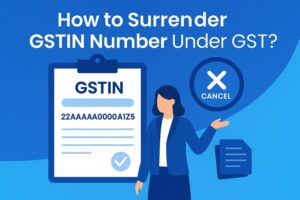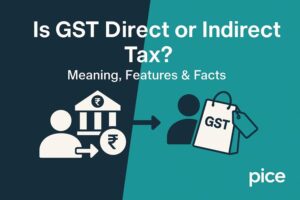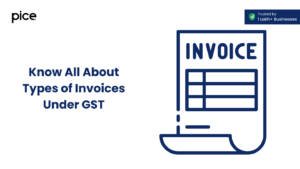Can GST be Refunded on the Cancellation of a Flat?
- 29 Aug 24
- 13 mins
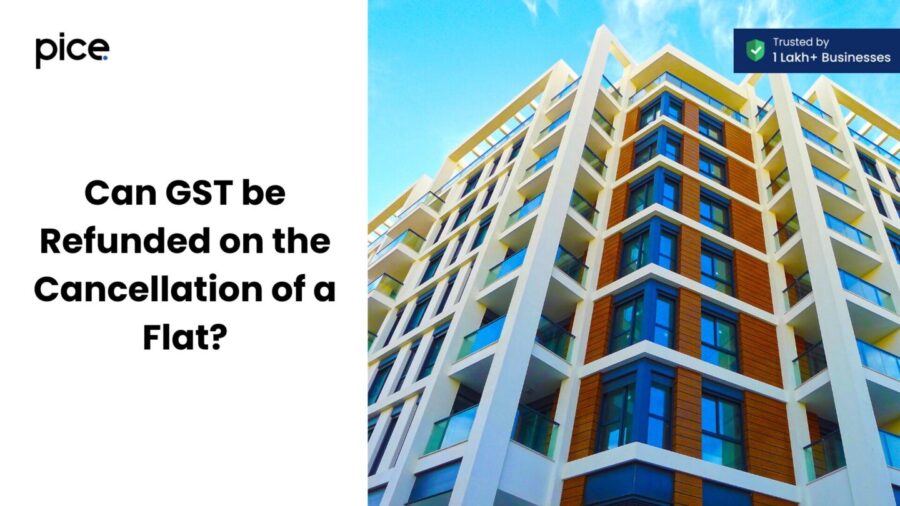
Can GST be Refunded on the Cancellation of a Flat?
- GST on Purchasing Residential Property
- Effects of GST on Buying Residential Property
- How to Avoid Paying GST on Flat Purchases?
- What Are the New GST Regulations for Property Purchases?
- Common Myths About GST on Buying Residential Property
- Who Is Responsible for Paying GST, the Builder or the Buyer?
- How Can I Claim a GST Refund for a Flat?
- What is the GST on Flat Cancellation?
- Example of the GST Rate for Cancellation Charges of Flats
Key Takeaways
- GST is applicable on under-construction property purchases but not on completed or ready-to-move-in flats.
- Buyers can avoid paying GST by purchasing completed properties with a Completion Certificate.
- Builders can claim Input Tax Credit (ITC) on GST paid for construction materials, potentially lowering property prices.
- GST on cancellation charges for flat purchases is typically 12%, and proper documentation is needed for refund claims.
- The process for claiming a GST refund involves submitting a refund application with necessary documents through the GST portal.
GST on Purchasing Residential Property
Goods and Services Tax (GST) is a comprehensive tax levied on the supply of goods and services, including residential properties. When purchasing residential properties, whether Affordable Properties or Non-Affordable Housing, understanding the GST implications is crucial. GST is applicable on the purchase of Construction Properties, including flats, houses, and other Residential Units. The GST rate for under-construction properties is typically 12%, whereas completed properties or those ready for possession without any pending construction work are exempt from GST.
When a Sale Agreement is executed between the buyer and the Property Builder, GST is charged on the sale price of the property. For Flat Purchases under construction, the buyer must pay GST as part of the total consideration. This tax becomes a part of the property cost and impacts the overall budget for the House Purchase. The Indian Government has streamlined the tax structure to ensure transparency and uniformity in the real estate sector, which includes the application of GST.
Input Tax Credit (ITC) is available for developers on the GST paid for inputs such as cement, steel, and other construction materials. However, this benefit is not directly transferred to buyers. ITC helps in reducing the tax liability of the developers, potentially lowering the cost of construction and, subsequently, the selling price of the property. Proper documentation and GST Registration are essential for claiming ITC and ensuring compliance with the GST regulations.
Unregistered Persons, those without a GST registration, must also understand that GST is included in the purchase price when they buy a property from a registered developer. The GST is collected by the Service Provider (the builder) and remitted to the government.
Effects of GST on Buying Residential Property
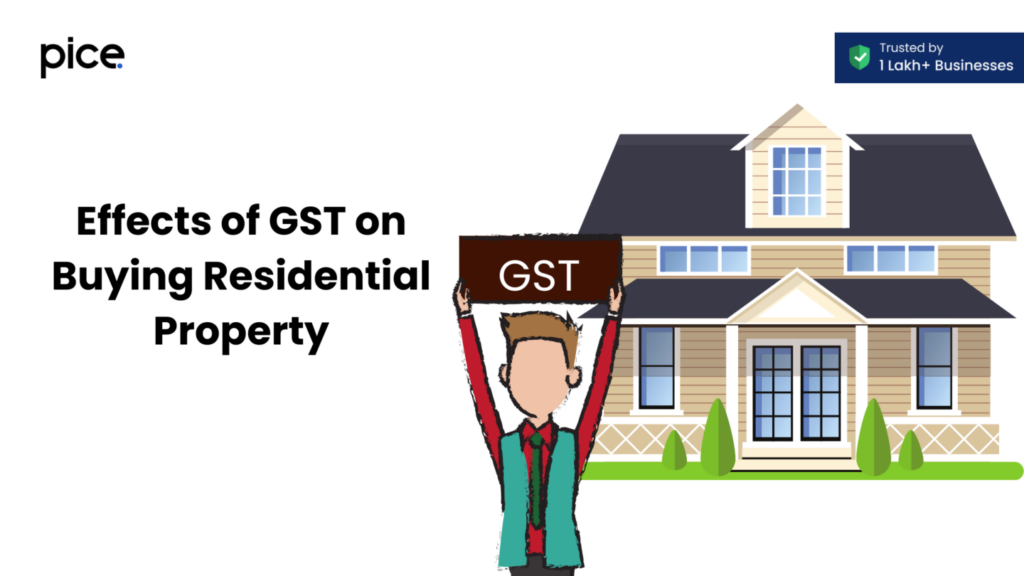
The introduction of GST has brought significant changes to the real estate sector. One of the primary effects of GST on buying residential property is the simplification of the tax structure. Before GST, buyers had to pay multiple taxes such as Value-Added Tax (VAT), Service Tax, Stamp Duties, and registration fees. Now, GST consolidates these taxes into a single tax, making it easier for buyers to understand their tax liabilities.
GST has a direct impact on the pricing of residential properties. For Affordable Housing Projects, the GST rate is lower, which helps in making these properties more accessible to the average buyer. However, for Non-Affordable Housing, the GST rate can add a significant amount to the total cost of the property. This is especially true for under-construction properties where GST is applicable.
Another impact of GST is on the availability of ITC for builders. This provision allows builders to claim credit for the GST paid on construction materials, which can reduce their overall tax burden. The savings from ITC can be passed on to buyers in the form of reduced property prices, although this depends on the builder's pricing strategy.
For buyers, understanding the GST implications is crucial for financial planning. The inclusion of GST in the property cost means that buyers need to allocate a higher budget for their Flat Purchases. Additionally, the process of claiming a GST refund in case of property cancellation has been streamlined, but it requires proper documentation and adherence to the stipulated procedures.
How to Avoid Paying GST on Flat Purchases?
Avoiding GST on flat purchases is possible under specific conditions. One way to avoid paying GST is by purchasing a completed property or a ready-to-move-in flat. GST is not applicable on properties that have received a Completion Certificate or are ready for possession. This exemption helps buyers save on the additional tax burden associated with under-construction properties.
Another method is to look for properties under the Affordable Housing Projects category. These projects attract a lower GST rate, making them a more cost-effective option. Buyers should check if the property qualifies as affordable housing as per the Indian Government's definitions and guidelines.
Temporary Registration is another factor that can help in planning property purchases. Buyers should ensure that the property builder has a valid GST registration and that all transactions are documented correctly. This can prevent potential issues related to tax compliance and avoid unnecessary complications.
Buyers can also consider negotiating with the builder to include GST in the final sale price. Some builders offer packages where the GST is included in the overall cost, providing clarity and preventing unexpected expenses. This approach requires a Detailed Discussion with the builder to understand the terms and conditions clearly.
Understanding the tax implications and planning the purchase accordingly can help in managing the financial aspects effectively. Consulting with a tax advisor or real estate expert can provide valuable insights and assist in making informed decisions.
What Are the New GST Regulations for Property Purchases?
The GST Council has introduced several regulations to streamline the real estate sector and provide clarity to buyers and builders. One of the significant changes is the introduction of a lower GST rate for Affordable Housing Projects, which stands at 1%. For other residential properties, the GST rate is 5%, provided the builder does not avail of ITC.
The new regulations also emphasize transparency and proper documentation. Builders must issue GST-compliant invoices and maintain records of all transactions. This ensures that buyers are aware of the GST component and can plan their finances accordingly. The regulations also mandate that builders cannot charge GST if the property has received a Completion Certificate.
Another important regulation is related to the claiming of ITC. Builders can claim ITC on the GST paid for inputs used in construction, but they must pass on the benefits to buyers. This provision aims to reduce the overall cost of construction and provide relief to buyers in the form of lower property prices.
The Indian Government has also simplified the refund process for property cancellations. Buyers who cancel their property purchase can apply for a GST refund through a Refund Application. The process requires the submission of proper documentation, including the original sale agreement and the cancellation agreement. The GST refund is processed within a specified Time Period, ensuring timely resolution for buyers.
These regulations aim to create a more structured and transparent real estate market, benefiting both buyers and builders. Staying updated with the latest GST rules and guidelines is crucial for making informed property purchase decisions.
Common Myths About GST on Buying Residential Property
Several myths surround the application of GST on residential property purchases, leading to confusion among buyers. One common myth is that GST is applicable on all property purchases. In reality, GST is only applicable on under-construction properties or those without a Completion Certificate. Completed properties or ready-to-move-in flats are exempt from GST.
Another myth is that GST has significantly increased the cost of property purchases. While GST does add to the total cost, it has replaced multiple taxes like VAT, Service Tax, and others, simplifying the overall tax structure. The net impact on the cost may vary depending on the type of property and the applicable GST rate.
Some buyers believe that only the buyer bears the GST cost. However, both the buyer and the builder share the GST implications. Builders can claim ITC, which can reduce their tax liability and potentially lower the selling price of the property. This benefit can be passed on to the buyer, although it depends on the builder's pricing strategy.
There is also a misconception that GST on property purchases is non-refundable. In cases where the property purchase is canceled, buyers can apply for a GST refund. The process requires proper documentation and adherence to the guidelines provided by the GST authorities.
Understanding the facts and dispelling these myths can help buyers make informed decisions and manage their property purchases more effectively.
Who Is Responsible for Paying GST, the Builder or the Buyer?
The responsibility for paying GST on property purchases primarily lies with the buyer. When purchasing an under-construction property, the buyer pays the GST as part of the total consideration. The builder, as the Service Provider, collects the GST from the buyer and remits it to the government.
💡If you want to pay your GST with Credit Card, then download Pice Business Payment App. Pice is the one stop app for all paying all your business expenses.
However, the builder also has a significant role in managing the GST implications. Builders must ensure that they are GST-registered and comply with all the regulations. They are responsible for issuing GST-compliant invoices to the buyers and maintaining proper records of all transactions.
Builders can claim ITC on the GST paid for construction materials and services. This credit can reduce their overall tax liability and potentially lower the cost of construction. Builders are expected to pass on the benefits of ITC to the buyers, which can result in lower property prices.
Buyers should verify that the builder has a valid GST registration and that all transactions are documented correctly. This can prevent potential issues related to tax compliance and avoid unnecessary complications. In the case of property cancellation, the builder must issue a Credit Note to the buyer, detailing the GST refund process.
Proper documentation and adherence to GST regulations are essential for both buyers and builders to ensure a smooth transaction process and compliance with the tax laws.
How Can I Claim a GST Refund for a Flat?
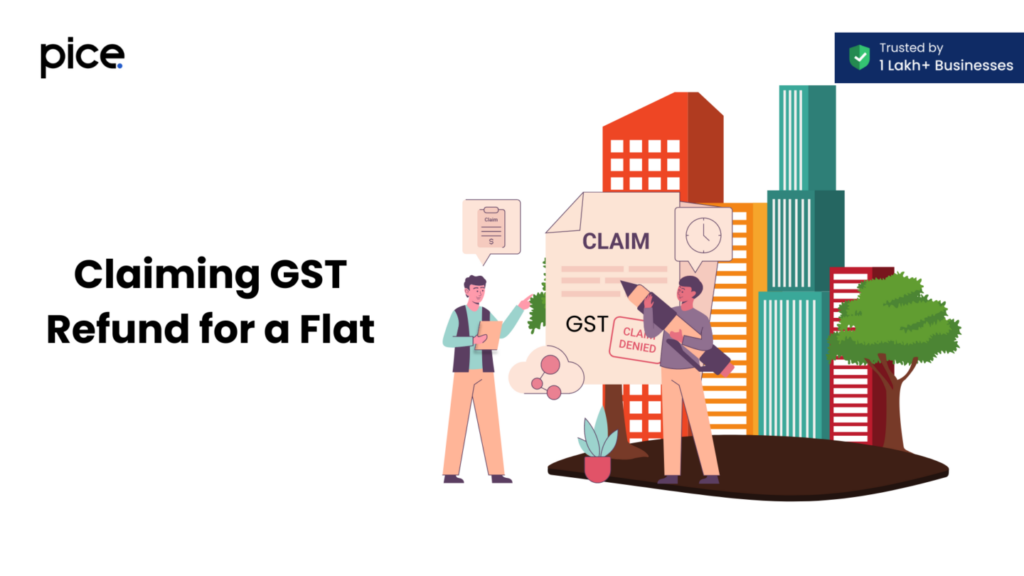
Claiming a GST refund for a flat involves a few steps and requires proper documentation. If a property purchase is canceled, the buyer can apply for a GST refund by submitting a Refund Application through the GST portal.
The first step is to gather all the necessary documents. This includes the original sale agreement, the cancellation agreement, and any GST-compliant invoices issued by the builder. Proper documentation is crucial to support the refund claim and ensure a smooth process.
Next, the buyer must log in to the GST portal using their credentials and navigate to the refund section. Here, they need to fill out the Refund Application form, providing details of the canceled property purchase and the GST paid. The form should include the buyer's Bank Account Details for the refund to be processed.
The GST authorities will review the application and the submitted documents. If everything is in order, the refund will be processed within the stipulated Time Period. It's important to keep track of the application status and respond promptly to any queries from the authorities.
Consulting with a tax advisor can provide valuable guidance on the refund process and help in preparing the necessary documentation. Proper understanding and adherence to the refund procedures can ensure a timely and hassle-free refund experience.
What is the GST on Flat Cancellation?
GST is applicable on the cancellation charges for flat purchases. When a buyer cancels a property purchase, the builder may charge a cancellation fee, which is subject to GST. The GST rate on cancellation charges is typically the same as that for the original property purchase – 12% for under-construction properties.
The cancellation fee, including GST, must be clearly stated in the cancellation agreement provided by the builder. Buyers should ensure they receive a detailed invoice that includes the GST component. This invoice is necessary for claiming a GST refund on the cancellation charges.
In cases where the property builder issues a Credit Note, it should include the GST details and the amount refundable to the buyer. This Credit Note serves as proof of the transaction and supports the refund application.
Understanding the GST implications on cancellation charges and ensuring proper documentation can help buyers manage their financials effectively and claim refunds without complications.
Example of the GST Rate for Cancellation Charges of Flats
Let's consider an example to illustrate the GST rate on cancellation charges for flats. Suppose a buyer has purchased an under-construction flat for Rs. 50 lakh, and the applicable GST rate is 12%. The GST amount paid on the property purchase would be Rs. 6 lakh, making the total cost Rs. 56 lakh.
If the buyer decides to cancel the property purchase, the builder may charge a cancellation fee. Let's assume the cancellation fee is Rs. 2 lakh. The GST on this cancellation fee would be 12%, which amounts to Rs. 24,000. Therefore, the total cancellation fee, including GST, would be Rs. 2.24 lakh.
The builder must provide an invoice for the cancellation charges, detailing the GST component. The buyer can then use this invoice to apply for a GST refund on the cancellation charges through the GST portal.
Proper documentation and adherence to the GST regulations are essential to ensure a smooth refund process and avoid any discrepancies.
In conclusion, understanding the GST implications on property purchases and cancellations is crucial for buyers and builders. Proper planning, documentation, and adherence to the regulations can help manage the financial aspects effectively and ensure compliance with the tax laws.
 By
By 








